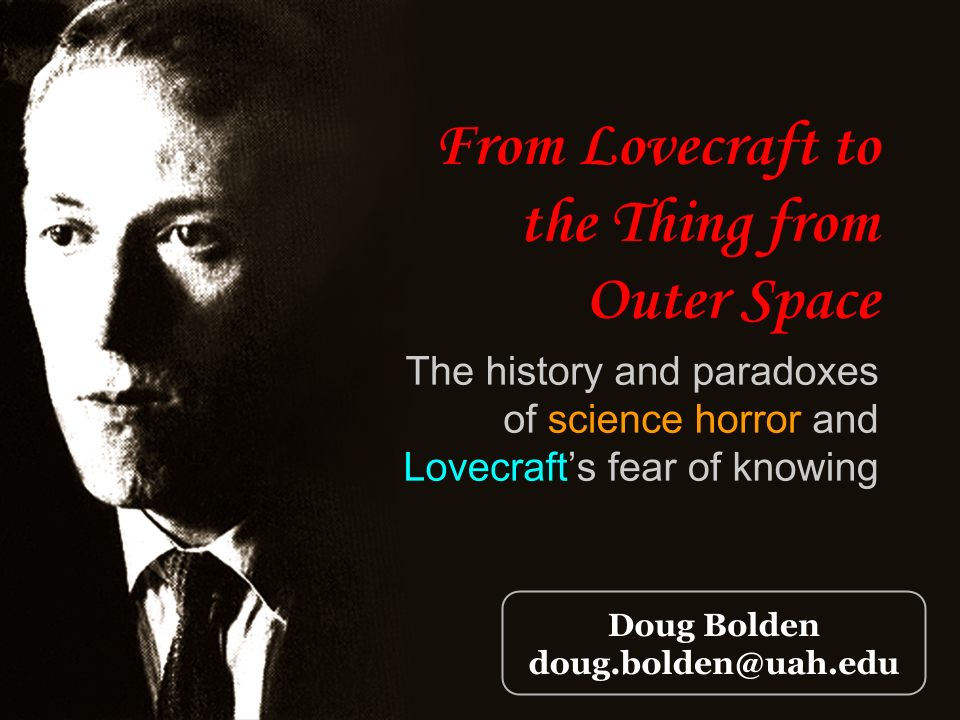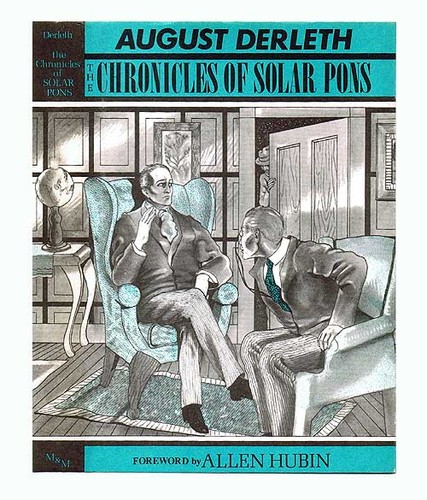This was meant to come out nearly a month ago, but here is a write-up of a talk I gave back on October 21, 2014: From Lovecraft to the Thing from Outer Space. It was a fun little talk, meant to combine a bit of Halloween fun with a serious discussion about the persistent bias against scientists in a particular flavor of science fiction and science horror.
Why did I want to talk about it (outside of the fun Halloween factor)? There has been a long series of events, generally kind of minor, where I would be reading some story or watching some show/movie, and the scientist type character would be just that tad more easily bent by the forces of evil than the noble military they were working with. Or the nerd would be dangerous element that lets down the team of good, wholesome jock types. Not in every case. I have not done a precise tally to see if it is even the majority – though I suspect so – but in many cases.
It came to full bear when I was doing some research on Lovecraft’s science and philosophy for a roundtable discussion on those things with the guys from the H.P. Lovecraft Literary Podcast. At the time, I was struck by the contradiction in Lovecraft’s personal philosophies about knowledge – complex as his personal stance might be on many things – and the way that knowledge and curiosity and reading always seemed to have negative consequences. An early version of the talk was entirely to focus on Lovecraft. Though I realized quickly into the process that it wasn’t just Lovecraft. There was a certain fascination with scientists as characters throughout pulp 20th century fiction and there was a continued notion of them as just a bit crazier than the average person, a bit more likely to bring about the end of the world, and even a bit dumber, if by dumb you mean “unable to realize the outcome of their own actions”.
This talk came out of that. As said at the thing, this is something more like a preliminary examination of the phenomenon. While some slides are less serious than others, the conclusion towards the end is something I would like to prove or disprove through further research. Have we created a fictional scientist archetype – and then applied concepts of a particularly virulent monastic archetype to it – and if we have, how far does this concept go? I have some ideas, and plan to start that next stage very soon.
Before I get to the slides, there are two things. First, I want to share a quote from James Turner’s introduction to Tales of the Cthulhu Mythos, [still one of the best many-in-one collections of stories about the extended mythos involved in Lovecraft’s fiction], which is good to keep in mind as we examine some of the conflicts of science and science horror:
With…developments in relativity, quantum mechanics, subatomic particles, and the like, the universe no longer seemed so comprehensible. Just as Copernicus and Galileo had wrenched humanity from the center of creation, so too had modern man come to realize that not only is he not at the center of the cosmos, but that he is a singularity in the cosmos. The universe with its neutron stars and quasars and black holes is strange to us, and we are a stranger in the universe.
Secondly, what took so long to getting this up is because the slides used in this talk (and there were quite a few) were only part of the story. There was a lot of commentary and references. I mean a lot. It was a very full hour. There was also some active feedback and commentary of which I wanted to try and make note. Had it been fewer slides, I might have tried a list of slide notes. Instead, I took advantage of Google’s Spreadsheets note function and have added a note to roughly half or more of the slides. What this means is that as you view them, to get the full experience, you need to view the slides with slide-notes turned on. It’s not the best interface, but it is worth going through at least with them to see what’s up.
I have been asked if I will be repeating this talk. Likely not in its current form. While I can talk about Lovecraft (and his writings) for hours, and while I am seriously concerned about prejudices and biases towards and against scientists, this was sort of a wide-net approach to two topics that are not quite the same – Lovecraft’s love and “hate” of science is not necessarily the general public’s. Bits of this talk might show up again – there seems to be a ripe place for several of its sub-themes – just not this one. It was a joyous passion project, now comes the time to shape it to something a little more solid.


